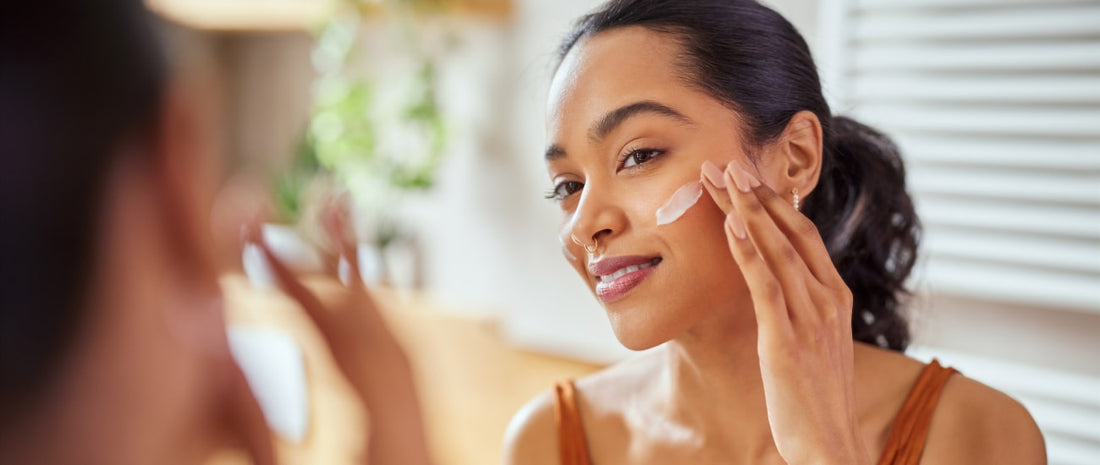
Moisturizing For Youthful Skin - Here's Why
In Summary: As you age, your body begins to lose its water volume and retention abilities. As this occurs, your skin begins to look more tired, less full, and more prone to wrinkles and damage. Thus, it's important to consistently moisturize to help your skin fight back! While your body naturally combats this by lubricating the skin via its pore and gland networks, the Sun and external factors can leave your skin requiring more.
Moisturizers do "more", but not how you think.
Moisturizers don’t necessarily add moisture to your skin, per se. They’re more complex & perform many functions. Here is what the research tells us:
1. PREVENT INFLAMMATION & BREAKOUTS.
Even sensitive, oily, and acne-prone skin needs to be moisturized.
Experts agree that poorly hydrated skin becomes more sensitive to allergens, acne breakouts, and other irritations. Sufficient moisturizing prevents the skin from cracking and becoming more sensitive.
Also, as you’re exposed to products or ingredients that are too harsh for your particular skin type, your body will release histamines. This manifests as either an allergic reaction or an acne breakout.
2. SLOWS DOWN AGING
Moisturizers make it easier to obtain healthy and youthful skin. Out of all the different topical products available (cleanser, toner, broad-spectrum sunscreen, etc.), the moisturizer is most key!
When the skin is dry, its barrier ability becomes impaired, which then allows external forces like pollutants, bacteria, and free radicals to damage healthy cells.
All of which can speed up your skin’s aging process. The result, of course, is fine lines, wrinkles, hyperpigmentation, and loose skin.
If you analyze anti-wrinkle or anti-aging creams, they tend to be mostly comprised of moisturizers. Nearly 80% of anti-aging products have ingredients similar to moisturizers. (e.g., anti-aging creams, eye/night creams, and firming creams).
They are all meant to enhance and seal in the skin’s water content. This ultimately helps improve & reduce the appearance of fine lines and wrinkles.
3. SUPPORTS DELIVERY OF ACTIVE INGREDIENTS
Most new-age moisturizers do more than moisturizing. Some contain ingredients such as exfoliants, antioxidants, and anti-inflammatories.
They are mixed with the moisturizer to deliver added benefits to your skin while running through your daily personal skincare routine.
As mentioned, each skin type requires different product qualities; this includes moisturizers. It could be based on your skin type, hormones, weather, daily Sun exposure, and more.
But a good moisturizer, at a minimum, will keep your skin smooth, lubricated, and balanced. The more advanced moisturizers also deliver other active ingredients to soothe, repair, and rejuvenate.
Understanding your skin type and its needs is crucial for optimal outcomes. Thus, researching each formula’s ingredients is essential.
4. PROTECT AGAINST THE ENVIRONMENT.
The skin’s primary duty is to protect us from the outside world, ward off toxins and bacteria, and maintain a stable body temperature. Without enough water or moisture, the skin loses its ability to perform these tasks effectively.
Hydration retention, as done with a moisturizer, allows the skin to maintain peak moisture levels and thus function at maximum efficiency.
5. PREPARE THE SKIN FOR MAKEUP.
As a barrier, skin also leverages moisturizers to facilitate a gap between your skin and any makeup you are using.
This is a good thing since makeup has unwanted chemicals. Lastly, hydrated skin allows for a more even, well-balanced makeup application, which leads to a more uniform & desired look.
6. IMPROVE YOUR COMPLEXION.
This one is relatively obvious - dry skin appears rough, scaly, and dull. Moisturizers remedy these issues.
Some moisturizers contain emollients and humectants that are designed to attract and trap moisture. Both can immediately improve your appearance.
Emollients and humectants make the skin feel soft and appear smooth. Humectants attract water from below the epidermis and from the atmosphere, while emollients soften the skin. The two work well together to provide reliable results!

Key Moisturizer Ingredients
There is a wealth of products designed to moisturize, including creams, serums, oils, and balms. It’s easy to get lost.
To simplify - most products fall into 3 categories: humectants, emollients, and occlusives. Each has a different action and set of ingredients. Understanding this will aid in your search for the right moisturizer! See the table below.

Top 4 Moisturizing Tips
1. Apply moisturizer when your skin is moist. The best time is usually right after taking a shower or bath. After using your cleanser, lightly pat your face to a light, damp state (do not rub). Then use your moisturizer to seal in existing moisture.
2. Choose products specifically designed for the face. Different skin types & areas have different qualities and needs. Facial skin is no different.

3. Adjust your moisturizers to your current geography, climate, and season. Remember, for all skin types, winter demands more substantial product types like balms, oils, and creams. During warmer & moister months, most people won’t need the lighter products (fluids & gels). These are generalities, but the key is to adjust.
4. Using a moisturizer gets the best results when combined with good lifestyle choices. Stay hydrated and ingest essential nutrients - vitamins, minerals, fiber, essential fatty acids, antioxidants, and collagen. Your food & lifestyle choices are the foundation of healthy, glowing skin.
Thank you for reading our post, we hope you found the information useful and have a better understanding of the importance of skin hydration on maintaining youthful skin appearance. Let us know if you have any additional questions or comments below.
~The HealFast Medical Team
















